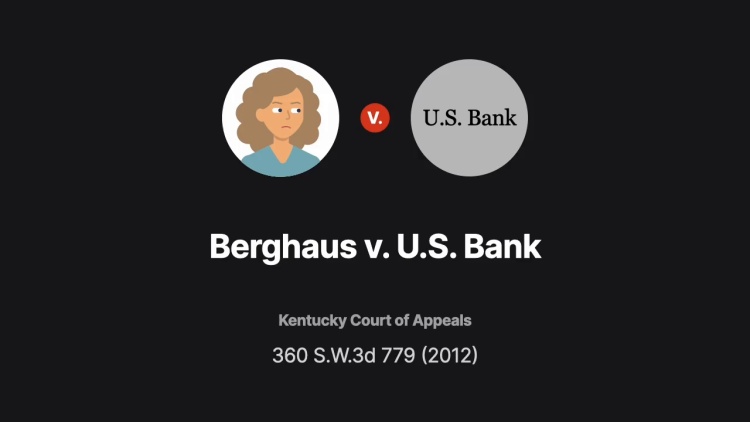Berghaus v. U.S. Bank
Kentucky Court of Appeals
360 S.W.3d 779 (2012)

- Written by Rich Walter, JD
Facts
Rachel Berghaus (defendant) applied for a mortgage-secured loan from Decision One Mortgage Co., LLC (Decision One). Before Berghaus signed the loan note, Decision One explained the note's terms to her, and gave her a government-approved disclosure statement. Both the disclosure statement and the note made it clear that, under the loan's adjustable-rate feature, Berghaus's initial 7.49 percent interest rate could go as high as 13.49 percent. Decision One assigned the note to U.S. Bank (plaintiff). A few years later, Berghaus' interest rate climbed to 12.625 percent, and she stopped making payments on the loan. The bank initiated a foreclosure action. The essence of Berghaus's defense was that Decision One's explanation misrepresented the actual terms of the note, in violation of the federal Truth-in-Lending Act (TILA), 15 U.S.C. § 1601 et seq. Berghaus was time-barred from suing Decision One as the loan originator, but she filed a counterclaim against U.S. Bank as the loan note's assignee. The trial court ruled that TILA's safe-harbor provision sheltered U.S. Bank from liability. The court granted the bank's motion for summary judgment, and Berghaus appealed to the Kentucky Court of Appeals.
Rule of Law
Issue
Holding and Reasoning (Combs, J.)
What to do next…
Here's why 907,000 law students have relied on our case briefs:
- Written by law professors and practitioners, not other law students. 47,100 briefs, keyed to 996 casebooks. Top-notch customer support.
- The right amount of information, includes the facts, issues, rule of law, holding and reasoning, and any concurrences and dissents.
- Access in your classes, works on your mobile and tablet. Massive library of related video lessons and high quality multiple-choice questions.
- Easy to use, uniform format for every case brief. Written in plain English, not in legalese. Our briefs summarize and simplify; they don’t just repeat the court’s language.





